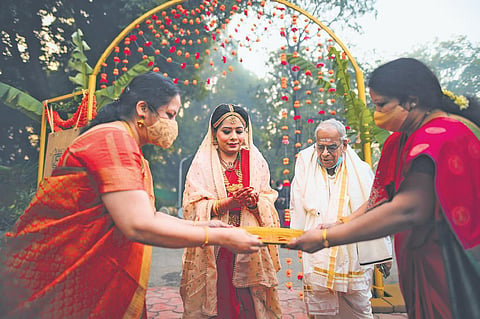

When Aditya Aggarwal and Madhuri Balodi, residents of East Delhi, decided to tie the knot in January last year, they were certain they wanted to steer clear from a quintessential wedding ceremony. The duo that lead a minimalist lifestyle were keen on hosting a sustainable celebration. Aggarwal ditched the baraat—a wedding procession popular in a few Indian communities. Alternatively, the groom made a grand entry on a Yulu e-bike. Another couple who wanted a green wedding were Sanjana Anand and Rishabh Gupta from Alaknanda. Anand and Gupta let go of the usual whim to have a sumptuous affair. Instead, they curated a plastic-free and sustainable procession at their September wedding last year.
As the wedding season resumes, we ask couples and wedding planners to list a few suggestions that can help you plan sustainable nuptials.
Green embellishments
Organising a lavish wedding—with a massive stage that is decorated using plastic adornments is the status quo in India. However, a number of people are upturning this by reducing the use of plastic and thermocol only to shift to eco-friendly alternatives. Anand decorated their venue with fresh flowers instead of regular embellishments. Indraja Khare, co-founder of Mumbai-based ‘Nose to Tail Events’ (the organisation, which planned Anand’s wedding) shares, “We used fresh flowers in two out of four events for Sanjana and Rishabh’s wedding. We tied-up with an organisation to whom we donated the used flowers, which they later used to make incense sticks and rangoli colours. We made sure that the flowers were not wasted.” Balodi, on the other hand, took the DIY-route. “One of my friends helped us with the decorations [they used old glass bottles to decorate the venue]. Our friends and family members made newspaper buntings that were hung at the venue,” she shares.
SUSTAINABLE CLOTHING
An important element in weddings is the outfit; nobody wants to go wrong with it. While Balodi only bought two saris for her celebrations, Anand made it a point that every outfit worn at her wedding is reusable. “I wanted outfits that I could reuse. As Tamilians, we usually wear the nine-yard sari. I chose something simpler that I can wear again and again. For my engagement, I wore my grandmother’s saree,” shares Anand.
Curated, Conscious GIFTS
Gifting is a huge part of most celebrations, and the Indian wedding is no different. However, most gifts are packed using plastic wrappers. Balodi, who designed her wedding card, printed a specific request on it stating that people must avoid carrying plastic to her wedding. “I specifically mentioned ‘please do not get any plastic wrappings." People complied. In fact, they wrapped their gifts in newspaper and handmade sheets. No one used plastic.”
MINIMISING FOOD WASTE
In a country like India, problems of hunger and undernourishment are rampant. In such a scenario, one should be conscious and try to offset food wastage, especially at weddings. If you are unsure about how best to achieve this, you can partner with organisations that help collect and distribute the excess food—which would normally have been wasted—among the needy.